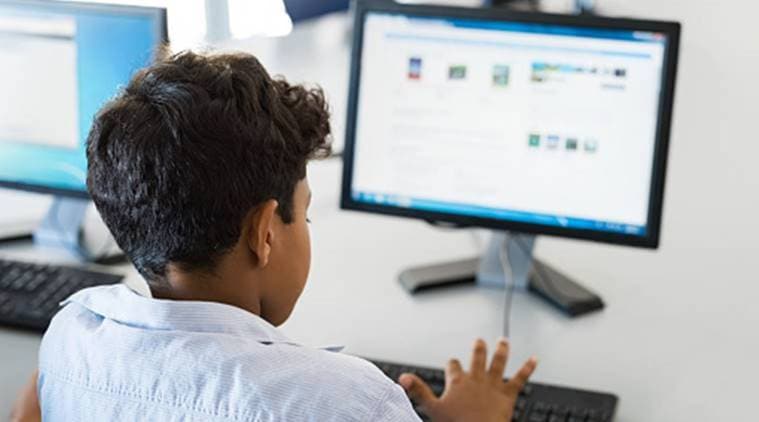 Several experts including pediatricians and psychiatrists have pointed out that long hours of online classes could lead to mental stress and fatigue in students at a young age. (Source: Getty images)
Several experts including pediatricians and psychiatrists have pointed out that long hours of online classes could lead to mental stress and fatigue in students at a young age. (Source: Getty images)
Hours after Karnataka Law and Parliamentary Affairs Minister J C Madhuswamy informed the state Cabinet’s decision to extend the ban on online classes till Class 7, state Education Minister S Suresh Kumar contradicted him saying the extension on the ban was just a “suggestion” made during the Cabinet meeting and “not a government decision”.
In a Cabinet meeting chaired by Chief Minister B S Yediyurappa on Thursday, Madhuswamy informed the Cabinet decision to extend the ban on conducting online classes till Class 7, two classes further than what was announced by Suresh Kumar on Wednesday.
“As we all know, students in rural areas face challenges to attend online classes. Hence, we have decided to extend the ban on online classes till Class 7,” Madhuswamy said.
However, a few hours later, Suresh Kumar made a contradictory statement, saying, “Karnataka government has decided to stop all online classes for LKG, UKG and classes up to 5th standard. To extend this up to 7th standard is only a suggestion from few cabinet ministers as expressed in an informal discussion and NOT a decision,” Suresh Kumar tweeted.
Suresh Kumar further said that even pre-recorded classes should be stopped “with immediate effect” for students studying till the fifth standard. “The (Education) Department will decide whether to allow pre-recorded sessions based on the report submitted by the expert committee which is expected within ten days,” he said.
An official order with detailed guidelines on how to hold online classes is awaited from the Karnataka government.
‘Instruct schools to adapt online learning from Class 6’
Suresh Kumar Thursday instructed department officials to instruct schools to adapt online classes for upper primary and high school students.
“Schools should be instructed on adapting online classes from classes 6 to 10. The expert committee formed to look into the matter will formulate guidelines for the same,” Suresh Kumar explained.
During the meeting, the Department of Public Instruction also decided to form a surveillance squad to ensure no school increases tuition fees for the ongoing academic year.
Long hours of online learning might lead to fatigue in kids: Experts
Several experts including pediatricians and psychiatrists have pointed out that long hours of online classes could lead to mental stress and fatigue in students at a young age. Dr Girish Chandra, Senior Consultant (Psychiatry) at Aster CMI Hospital in Bengaluru, said such online classes would become exhaustive, boring, and stressful for children and teachers with its own struggles of distant learning and no physical interaction.
“School authorities need to be aware that the average attention span of kids at these ages is 10-20 minutes. Keeping longer hours will not promote learning but only lead to fatigue,” he said.
Meanwhile, Sridhar Rajagopalan, co-founder and Chief Learning Officer at Educational Initiatives, an ed-tech company, opined that screen time for children should be controlled with ample precautions being taken in using gadgets.
“If students restrict themselves to about 100 minutes of screen time in a day (including regular use of phones, video calling, and TV) and about 60 minutes of this is focussed on education, learning will not suffer. Hence, the negative effects of excess screen time can also be avoided,” he said.
Rajagopalan added that programmes that focus on interactive learning encouraging the student to answer something or participate in activities would work better.
At the same time, Krishna Kumar, CEO and Founder of Simplilearn, a Bengaluru-based certification training provider, criticised the government’s decision terming it ‘hasty and illogical’.
“How can watching videos or watching TV be good and listening to teachers and interacting with classmates be bad,” he asked, adding that he was happy as a parent with classes conducted by the school his son studying in the first standard goes to.